Rani Durgavati- An Epitome of Bravery
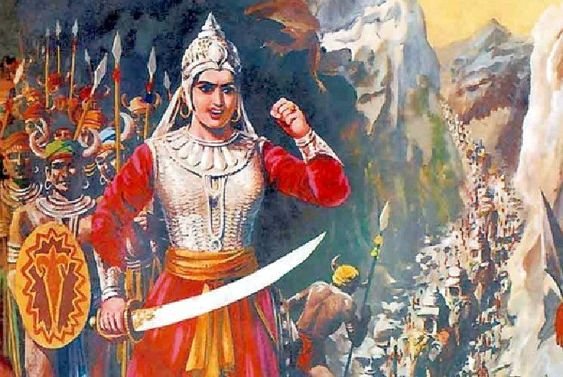
A wise ruler, a bold queen and a graceful highness Rani Durgavati was a lot more than just a Gond queen. She was named after the fierce Hindu goddess Durga, who is worshipped highly by the Hindus in almost every Indian state. She fought against the Mughal rulers courageously and was hence known for her stance against the Mughals.
Rani Durgavati was born on October 5, 1524 to Raja Salbahan of Ratha and Mahoba. She was born in Kalinjar, which is a famous fort city in Uttar Pradesh,India. According to the Indian Culture, it is said that “Durgavati was born on the day of Durgashtami and hence she was called so”. Ratha and Mahobas are famous descendants of the Chandelas who built the magnificent Khajurao temple and defended attacks of Mahmud Ghazni in the past. At the age of 18, she was married to Dalpat Shah, the son of a Gond King, Sangram Shah, hence bridging an alliance between the two royalties. They belonged to the Garha-Katanga clan.
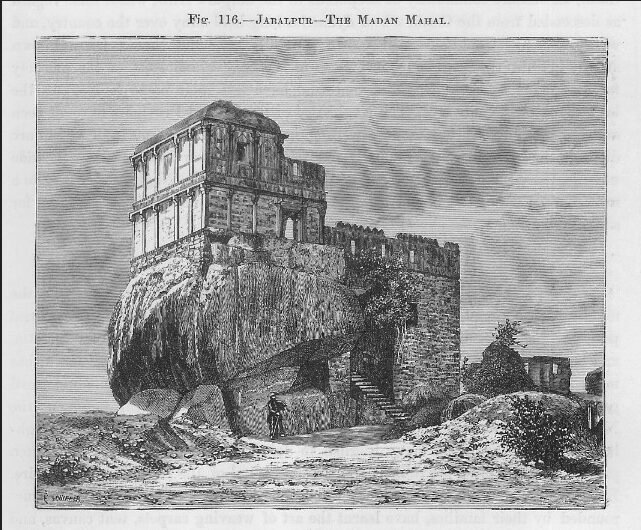
Dalpat Shah died in 1548. Now their minor son Bir Narayan was the only heir to the throne. Durgavati decided that her son would accede to the throne and she would take over the administration. She was assisted by two very able ministers Man Brahman and Adar Kayastha. Her reign was so strategic and booming that her kingdom began to flourish. It is said that people paid taxes in gold and elephants. She was a queen who supported education highly, and hence also allowed Acharya Bitthalnath to establish a seat of the Pushtimarg Cult at Garha.
Rani Durgavati led her armies and went to the battlefield to fight her enemies. She had a large empire, stretching in all four directions – east, west, north and south. It is estimated that she had 20000 cavalries, 1000 elephants and a large infantry.
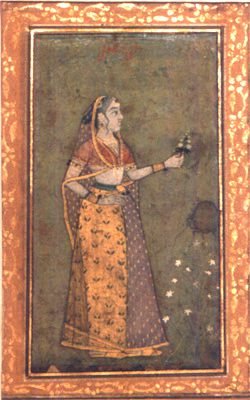
In 1556, after the death of Sher Shah Suri,Shuja Khan captured the Malwa plateau. Later Shuja khan’s son Baz Bahadur ascended to the throne. He attacked Rani Durgavati’s kingdom but the attack was repulsed bravely by the queen. Further in 1562, Akbar defeated Baz bahadur and took over his kingdom. Now the Mughals were in close proximity to Garha.
A Mughal general, Khwaja Abdul Majid Asaf Khan was very much impressed and attracted by the wealth and prosperity of Rani Durgavati’s state and hence with the permission of Akbar he invaded her kingdom.
When Durgavati heard about Asaf Khan’s attack she decided to defend her kingdom. She planned out her best strategies. Her ministers pointed out the flaws but as it is famous in history Durgavati states that “it is better to die fighting than to die a humiliating death.” She decides to enter the battlefield.
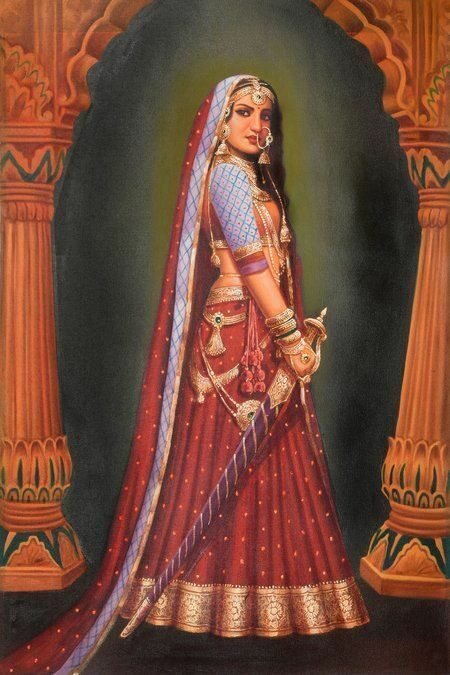
It is said that she set out with just 500 men, while the enemy had 10,000. She collected people on her journey, crossing hills and valleys and reaching Narhi. Narhi was a strategic location. It had steep hills on one side and the crossing of two rivers- Narmada and Gaur. This makes the entry and exit to this place a hard task. Asaf khan was unable to locate her for a while.
But soon he found out she was at Narhi. Now the Rani called a meeting and decided that it is a do or die situation. All her men, now 5000 decided to stay and fight. The next day the Mughal troops captured the heads of the ravines that led to Narhi. The commander of Rani’s war elephants, Arjun Das Bhai, died defending the pass. On hearing this the Rani, herself led her soldiers to war. Her strategy worked on that day. She ordered her men to move slowly to allow the enemy to enter the pass. Then she led her men to attack them from all sides. Her small force was able to defeat the Mughals and, at the end of the day, 300 men of the enemy were killed while the others were chased away. The same night she called a meeting of the war council and proposed to carry out a night attack on the Mughals. This would prevent them from bringing their artillery inside the pass.
Her generals did not agree with her plan. But Rani was right about her intuition. The next day Asaf Khan brought his huge guns inside the pass. The Rani now had to face this battle. Ready with her armour she mounted on her favourite elephant, Sarman,along with her son and led their army to fight. They were able to push back the Mughal soldiers at least three times. The battle went on till 3 in the afternoon. Bir Narayan was badly wounded and had to exit from the battlefield. The Rani continued fighting until two arrows struck her. She pulled them out but fell unconscious. On regaining consciousness, she realised that she had lost the day.

She asked her ‘mahout’ Adhar Baghela, to kill her with his dagger. Baghela refused. He said he would take her to a safe place. The Rani realised that they would not be able to go too far and would soon fall into the hands of the enemy. She now took out her dagger and stabbed herself in her heart. Thus, on the 24th of June 1564, died brave Rani Durgavati, with honour and not humiliated. Her men cremated her in a narrow mountain pass some 12 miles from Jabalpur.
There are certain notable things that Rani has done. She was a person who believed in secularism and promoted religious integrity in her kingdom and hence she appointed generals from all religions. She built several wells and made sure to conserve lakes. She built orphanages and old age homes. She was a kind hearted lady, an epitome of a noble queen.
The Madhan Mahal fort of Jabalpur is associated with Rani durgavati and her son. The Jabalpur university was also renamed as rani durgavati Vishwa Vidyalaya in her memory. The Indian government also released a stamp in her honour on 24th June 1988. ICGS Rani Durgavati, a coast guard ship which is an Indian patrolling vessel is also dedicated to her. The durgavati express train is also named after the brave queen.
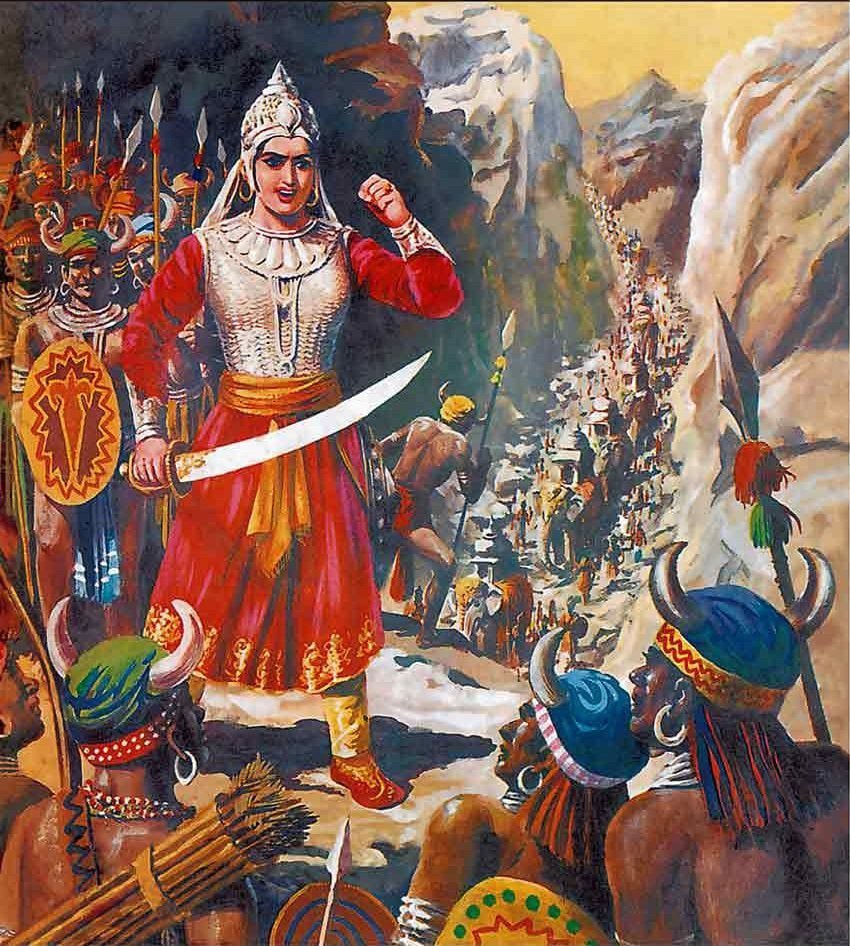
She was not just an ordinary queen, she was limitless, she was brave, she was graceful and yet she could shatter the enemies with her sword. This is the story of Rani Durgavati- An epitome of bravery.


